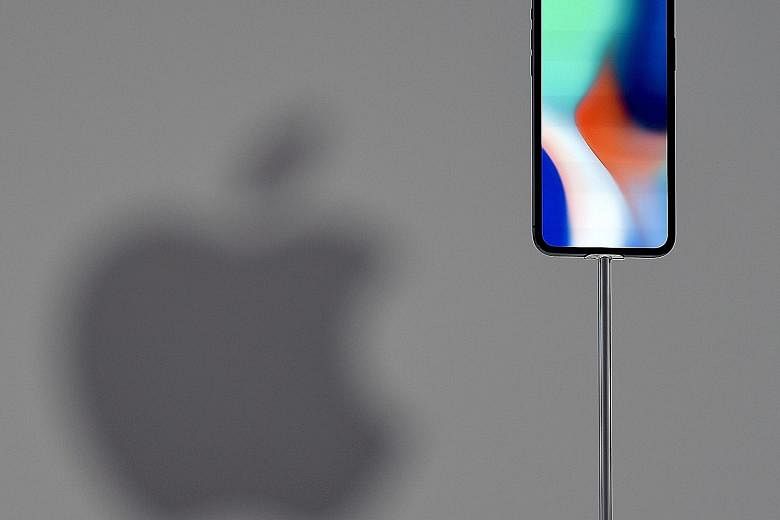NEW YORK • Apple will open a new campus as part of a five-year, US$30 billion (S$39 billion) US investment plan and will make about US$38 billion (S$50 billion) in one-time tax payments on its overseas cash, one of the largest corporate spending plans announced since the passage of a tax cut signed by US President Donald Trump.
The company has been under increasing pressure to make US investments since the 2016 presidential campaign, when Mr Trump targeted the iPhone maker for making products in Asian factories.
While Apple has announced no plans to change that practice and experts say it would be economically impractical to make iPhones in the United States, the company has begun to emphasise its US economic impact, from developers who sell software on its App Store to the tens of billions of dollars per year it spends with US suppliers.
Between the spending plan, hiring 20,000 people, tax payments and business with US-based suppliers, Apple on Wednesday estimated it would spend US$350 billion at home over the next five years. But it did not say how much of the plan was new or how much of its US$252.3 billion in cash abroad - the largest of any US corporation - it would bring home. In addition to the US$38 billion in taxes it must pay, Apple has run up US$97 billion in US-issued debt to pay for previous share buybacks and dividends.
Some investors said the US investments would give the company room to make more stock buybacks or pay dividends without criticism.
Apple shares on Wednesday closed up 1.7 per cent to US$179.10.
Mr Trump described the move by Apple as a victory for his efforts.
"I promised that my policies would allow companies like Apple to bring massive amounts of money back to the United States. Great to see Apple follow through as a result of TAX CUTS," he tweeted.
Asked by ABC News whether the job creation announcements were directly related to the Republican tax plan, Apple chief executive officer Tim Cook gave a measured response. "Let me be clear: There are large parts of this that are a result of the tax reform, and there're large parts of this we would have done in any situation," he said.
About a third of Apple's new spending will be on data centres to house its iCloud, App Store and Apple Music services. The US spending would be a significant part of Apple's overall capital expenditures.
Globally, it spent US$14.9 billion last year and expects to spend US$16 billion this year, figures that include both US-based investments in data centres and other projects and Asian investments in tooling for its contract manufacturers.
If Apple's overall capital expenditures expands at the same rate expected this year, the US$30 billion investment in the US could represent about a third of its capital expenditures over the next five years.
The tax Bill requires companies to pay a one-time 15.5 per cent tax on foreign-held earnings whether they intend to bring them back to the US or not.
Apple had set aside US$36.3 billion in anticipation of tax payments on its foreign cash, meaning the payment would not represent a major impact on its cash flow this quarter.
Separately, Apple told employees on Wednesday that it is issuing a bonus of US$2,500 worth of restricted stock units. Apple workers below a senior level known as director will be eligible to receive stock units.
REUTERS, BLOOMBERG
The offshore incentive
To avoid the US' high statutory tax rate and its taxation of foreign profits once brought onshore in the US, American companies have used various ways to move as much of their income outside the US as possible.
Caterpillar saved US$2.4 billion (S$3.2 billion) from 2000 to 2012 by changing the address of its global parts business to Switzerland from the United States, Bloomberg said.
The US taxes its companies on their global profits, unlike the rest of the world, which taxes domestic profits only. It also allows companies to defer paying tax on those offshore profits until they are brought back to the US. This has led to companies such as Apple stashing their earnings overseas.
Apple, Caterpillar and Google parent Alphabet have come under fire for booking profits in places like Bermuda, the Cayman Islands and Ireland.
Last October, the European Union ordered Amazon to pay €250 million (S$404 million) in back taxes to Luxembourg. That followed a 2016 EU order that Apple repay €13 billion in back taxes to Ireland.
In the US, there have been moves to cut corporate taxes in order to encourage American companies to bring their earnings home and thus boost the US economy.
In its December approval of the most extensive tax-code revisions since 1986, Congress scrapped the arrangement that had allowed companies to defer US income taxes on foreign earnings until they returned the income to the US, Bloomberg said.
There is now a two-tiered levy on that accumulated foreign income: Cash will be taxed at 15.5 per cent, less liquid assets at 8 per cent. Companies can pay over a period of eight years, Bloomberg reported.

